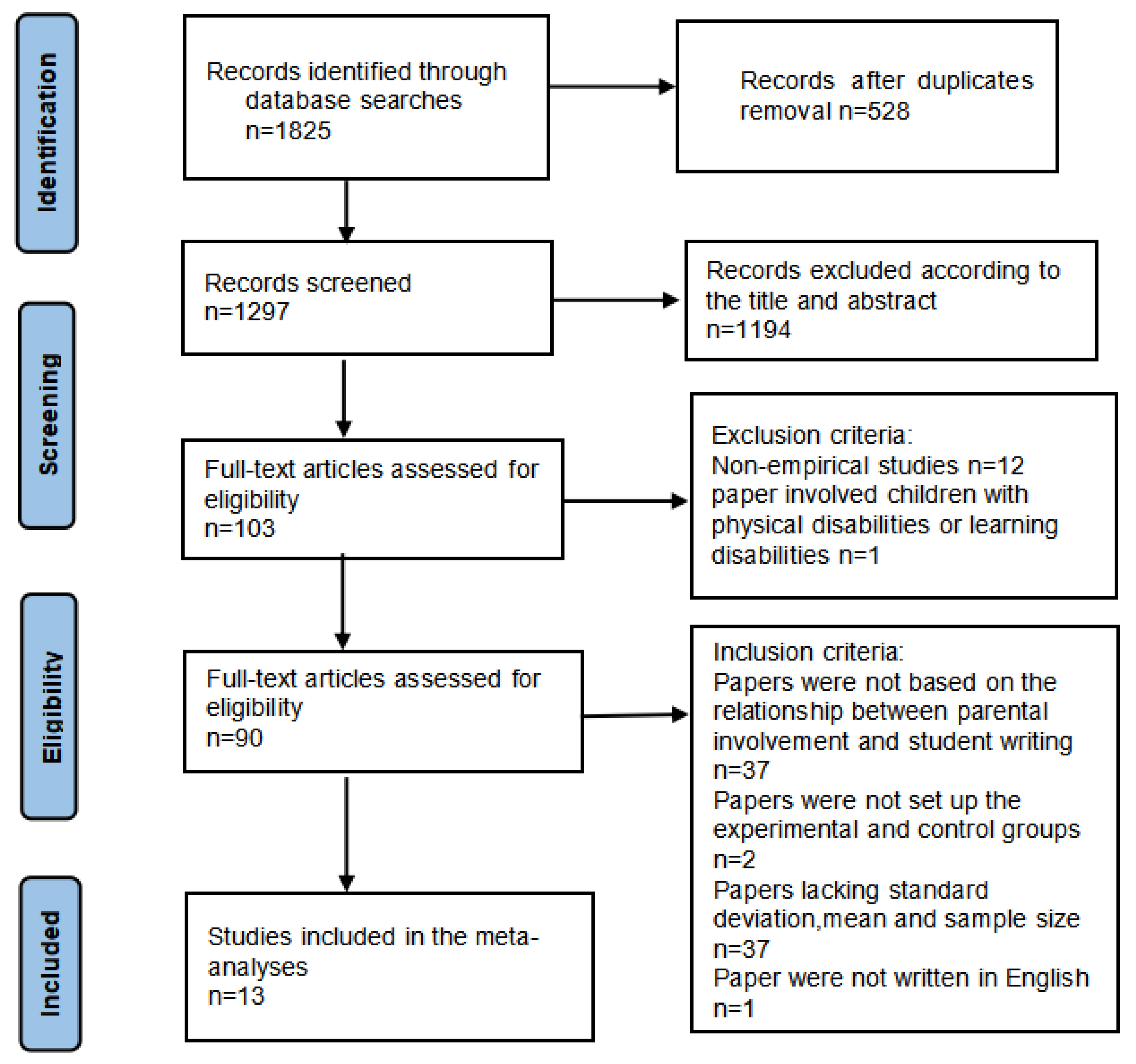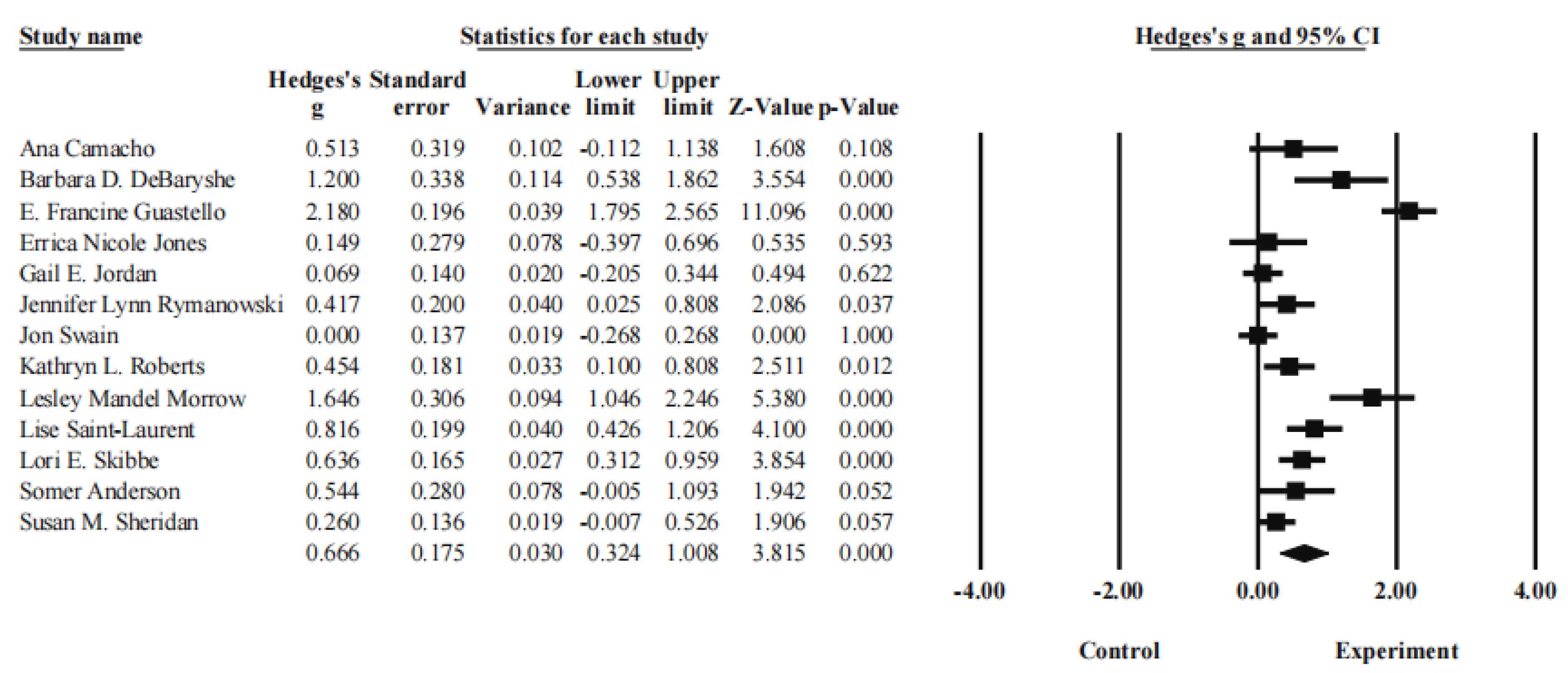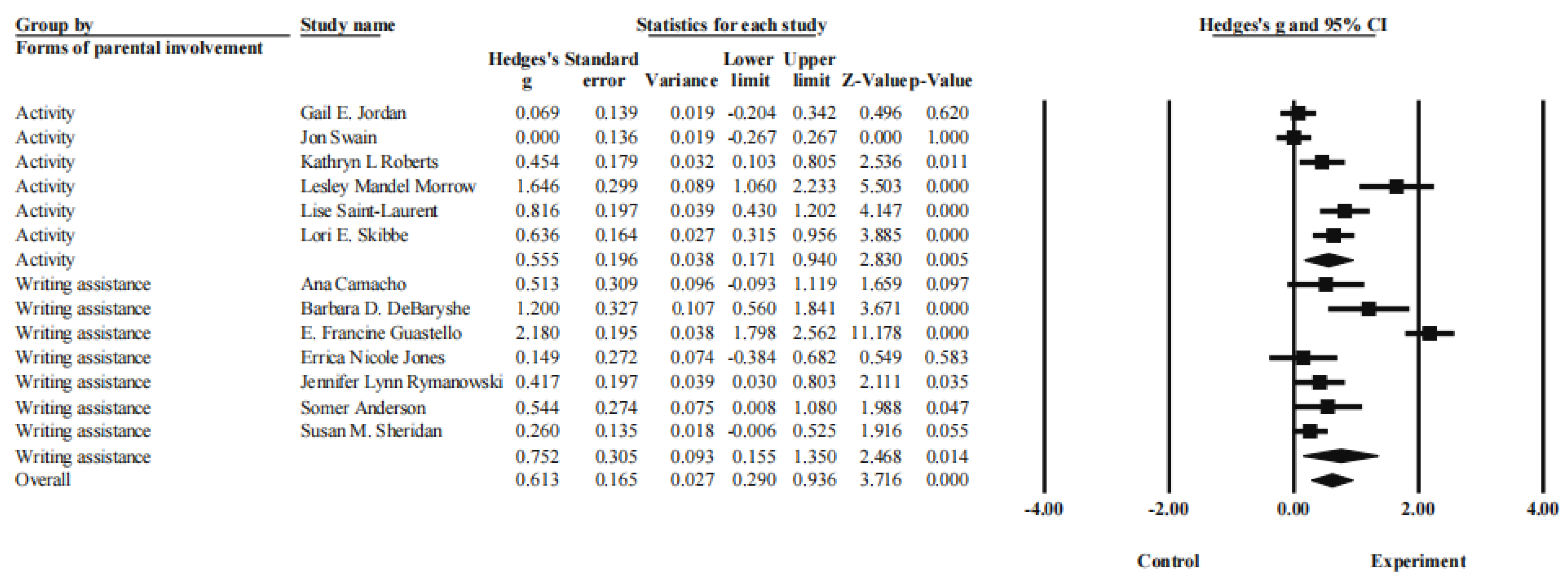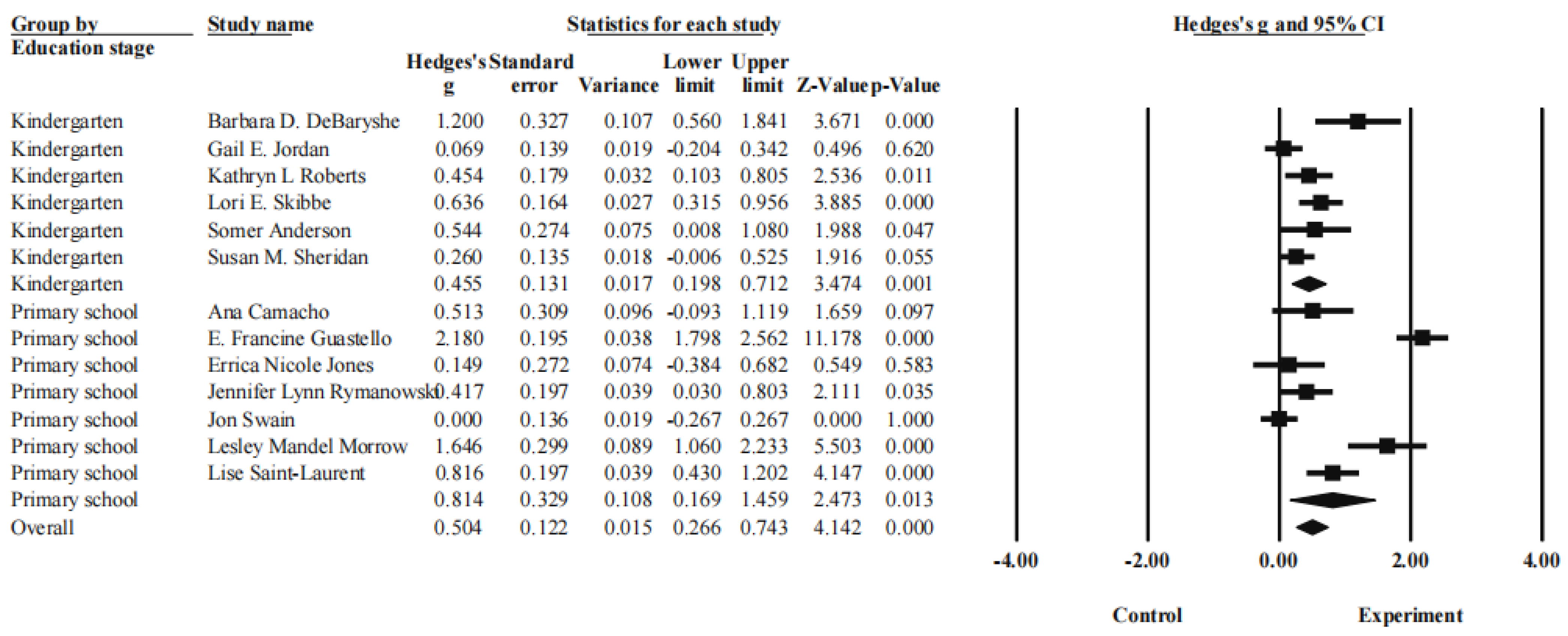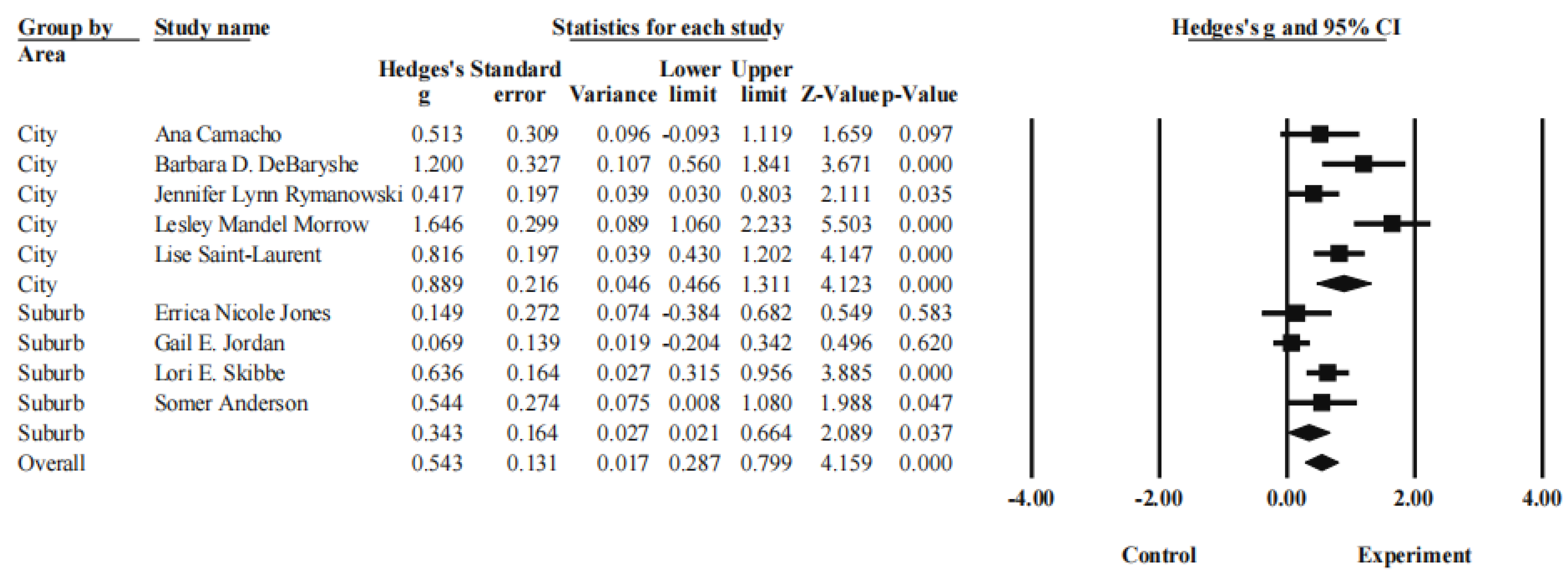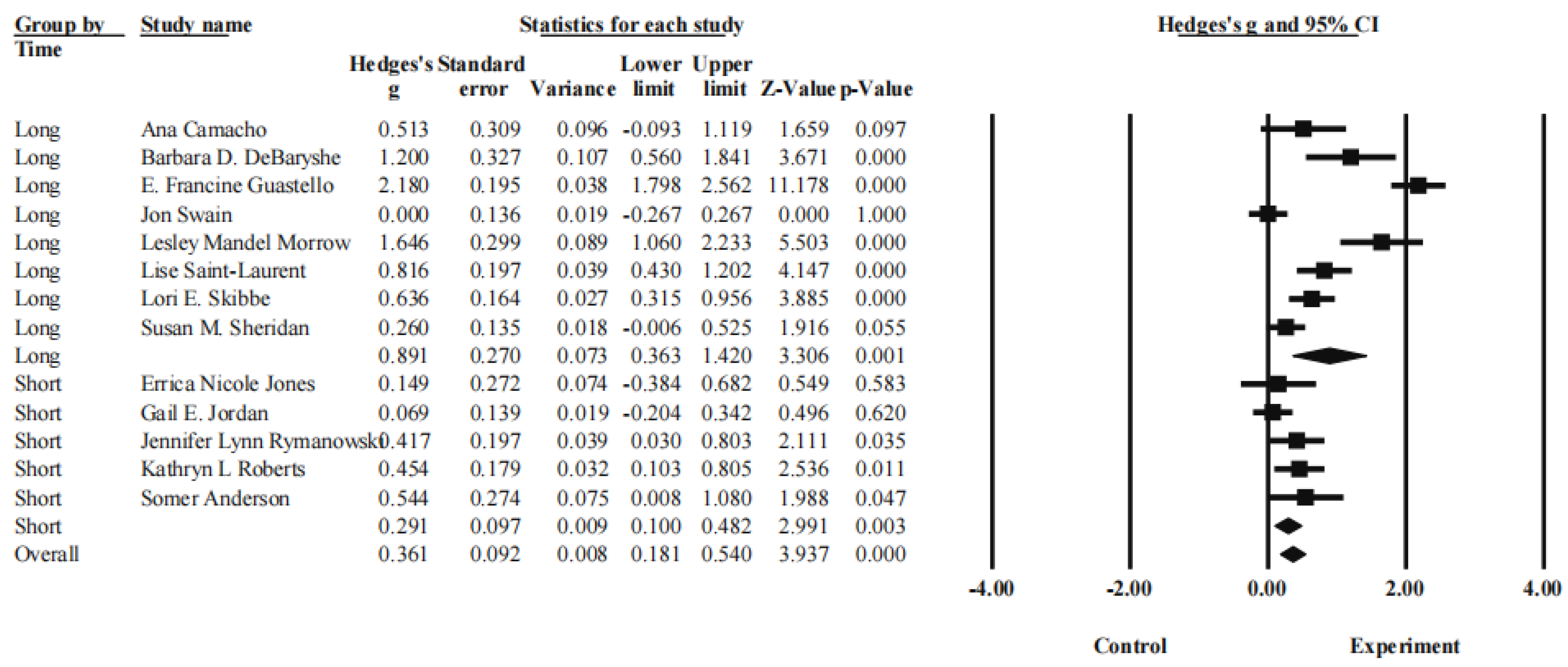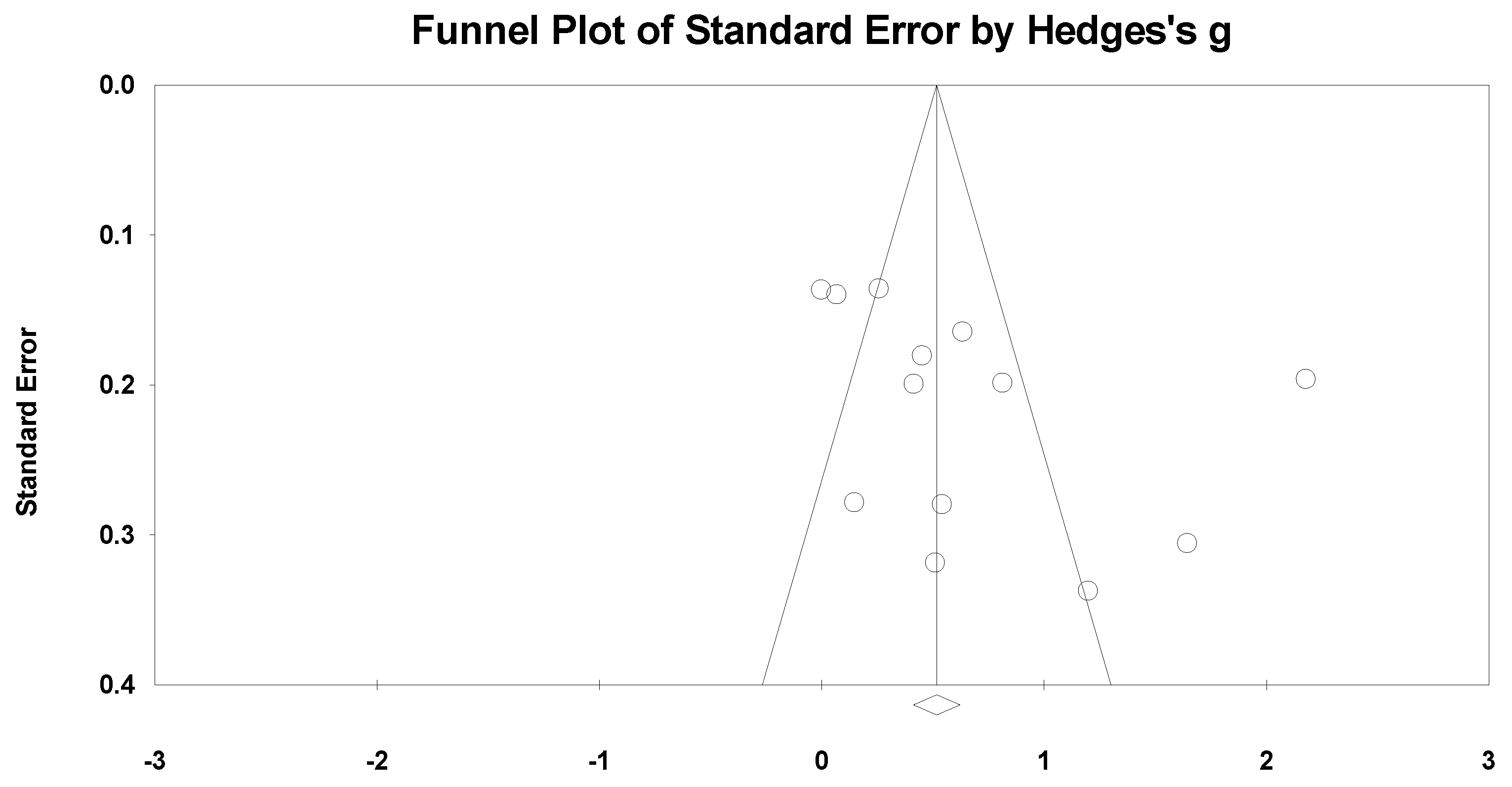Abstract
The impact of parental involvement on student academic achievement has been confirmed by many studies. However, researchers differ on whether parental involvement can statistically improve student writing skills. Furthermore, the association between parental intervention duration and student writing ability is unclear. Consequently, this study examines the impact of parental involvement on student writing ability through a meta-analysis of 13 studies conducted between 1996 and 2021, with effect sizes of 117 and 1449 participants. Three main findings in the meta-analysis results werek identified. First, the overall effect of parent writing participation on student writing ability was statistically significant, resulting in a moderate positive effect (g = 0.666 95% CI [0.324, 1.008]), p < 0.001). Second, parental participation behavior methods and student educational stages had no significant impact on student writing ability. Third, differences in school area and parental intervention duration had a significant impact on student writing ability, suggesting that parental involvement has a greater role in promoting an improvement in student writing ability in urban schools, and that long-term intervention is more conducive to improving student writing ability.
1. Introduction
Parental involvement plays an important role in promoting children’s cognitive development and academic performance. Moreover, some empirical studies have confirmed that parental involvement can improve student writing performance and ability [1,2,3,4,5]. However, other empirical studies have found that the effect of parental involvement on student writing ability is not statistically significant [6,7]. Past meta-analysis studies have indicated that certain variables, such as the form of parental involvement, student education stage, and school area can influence student academic achievement, but their impact on student writing ability is still unclear. Furthermore, the effect of parental intervention duration on student writing ability has also not yet been demonstrated. Therefore, this paper aims to investigate the overall impact of parental involvement on student writing ability and examine the role of the above four moderators in the correlation between parental involvement and student writing ability.
1.1. The Definition of Parental Involvement and Influencing Factors
The Definition of Parental Involvement: The concept of “parental involvement” originated in the 1960s, and in that period, researchers had not yet reached a consensus on it. From the standpoint of parental involvement, Hill et al. attached importance to the results of parental involvement; they defined parental academic involvement as parents promoting their children’s educational outcomes and future success by cooperating with schools and their children [8]. Jeynes stressed parental participation as the process and experience of parents participating in their children’s education [9]. Until 2012, Jeynes concretized this definition and proposed that parental involvement is a regular, two-way, and meaningful communication between parents and students about student learning and school activities [10]. In contrast, certain researchers have highlighted that parental involvement is a one-way activity for parents. For example, Erdem and Kaya noted that parental involvement is simply parents’ effort in promoting their children’s academic and social development [11]. El Nokali et al. advised that parental involvement is only parents’ behavior, whereby they aim to support their children’s educational progress at home and at school [12]. Castro et al., from a sociological perspective, advised that parental involvement is not only the right and duty of family, but also a need for social development [13]. Without active home–school cooperation, a child cannot achieve high standards in their educational results. Although the concept of parental involvement is not unified, researchers generally believe that parental involvement includes two important dimensions; namely, parental involvement that is based on the school, and parental involvement that is based on the family [8,14,15,16,17].
Type of parental involvement: Following an exploration of the concept of parental involvement, certain researchers no longer focus only on what the concept is itself; rather, they have turned to investigating the specific types of parental involvement [18]. From the perspective of place, researchers tend to divide the main places of parental involvement into either at school or with the family. Adodo emphasized that school involvement includes parents engaging in school or parents participating in certain activities through the school [19]. Epstein believed that school-based parental involvement includes designing effective ways for family–school communication, organizing and recruiting parents to volunteer, and involving parents in school decision making [20]. Other researchers have argued that family-based parental involvement is also important. Jeynes declared that high expectations, parent–child communication, parenting methods, and family rules are important approaches in family-based parental involvement [21]. Kim advised that family-based parental involvement includes reading with children, checking homework, and communicating about schools [22]. Later, by integrating these two perspectives, certain researchers have argued that parental involvement can occur in both the school and with the family. These researchers believe that school-based involvement includes communicating with teachers or the participation of parents in school activities, and family-based involvement includes providing learning and educational support for children by parents at home [15,17]. Rattenborg et al. believed that school-based parental involvement includes parents helping schools to carry out activities and conducting family–school communication, and family-based parental involvement includes parents supporting their children’s homework and learning at home [16]. To summarize, parental involvement can occur in the school and family, and they cannot be separated from each other. Therefore, this study defines parental involvement as parents participating in writing activities both with the family and at the school, in addition to providing conditional support and writing assistance for students.
Forms of parental involvement: Parental involvement can be specifically divided into behavioral participation and emotional participation. Several studies have advised that the emotional participation of parents, such as expectations, communication, and encouragement, can improve student academic performance [18,23,24,25,26], and this effect does not change because of student age, race, gender, or ethnicity [27]. There is a serious lack of research on how parental behavioral participation affects student writing in the existing studies. Therefore, this paper focuses, through a meta-analysis, on testing the influence of parental behavior in terms of participation on student writing ability.
In order to examine the effect of parental behavior participation approaches on student writing ability, we refer to Erdem and Kaya, who stated that parental involvement covers parental control, learning assistance, communication, support, expectations, activities, and academic socialization [11]. Furthermore, parental participation behavior is divided into activity participation, which focuses on parent–child activities, such as reading with children and telling stories to them and is mainly for students in pre-school or primary school, and writing assistance, which means that parents that help with their children’s writing when facing difficult academic tasks. It is clear that family literacy activities can help to improve student writing performance [28]; this is because parents can help their children to improve their text generation skills, and can mobilize their cognitive strategies to equip them with the higher cognitive processes related to writing [29]. Moreover, as far as writing assistance is understood, Aram showed that, if parents write with their children and provide effective guidance methods, then their children’s reading and writing skills will greatly improve [30]. Meanwhile, Skibbe et al. stated that parent–child writing can improve a child’s abilities in oral English, vocabulary, phonetic awareness, letter knowledge, and writing, which are achieved through the practice and integration of skills [31], thus further identifying the important role of parental writing support. Though existing empirical studies have identified that both parents’ activities in participation and writing assistance can improve student writing ability, no meta-analysis study has systematically demonstrated the difference in the effect of these two behavioral participation approaches on writing ability. Therefore, this paper aims to test the effectiveness of parental activity in participation and writing assistance on student writing ability.
The function of parental Involvement: Family was identified as the main factor in student academic performance by the Coleman report [32]. As a particularly powerful but underutilized source of knowledge [33], parental involvement has positive impacts on student development in many ways. Firstly, parental involvement contributes to student academic performance. Existing empirical studies have found that student academic performance is improved when they participate in academic activities with their parents outside of school [34], resulting in adolescent academic success [35]. This is due to a parent’ high educational expectations, communicating with their children about school activities and promoting their children’s reading habits [13]. Secondly, the development of student comprehensive ability benefits from parental involvement. Previous studies have identified that parental participation in teaching and management enhances student competitiveness, improves the development of their learning skills, stimulates their learning motivation [36], and improves their active emotions [37]. Finally, parental involvement might be helpful for developing student writing ability. Although writing activities depend more on student inner motivations, the role of parents in stimulating student writing should not be underestimated [33]. Hall showed that family involvement has a significant effect on student learning; meanwhile, students also hope that their families will participate in their learning [38], which confirms the importance of parental participation in student writing. Additionally, several studies have further identified that parental involvement might be beneficial for student writing ability [1,2,3,4,5].
Though existing studies have considered parental involvement as beneficial for student writing, certain studies have found that parental involvement does not have a statistically significant impact on students’ academic achievement and writing skills [6,7]. For example, Mattingly et al. showed that there is no substantial evidence that parental involvement programs can promote students’ academic achievement [39]. Rymanowski stated that parent participation in their experimental group did not improve student writing fluency more than that found in the control group [40]. Furthermore, certain studies have uncovered that parental involvement has a negative impact on student development. For example, Domina stressed some of the ways in which parental involvement may not promote child cognitive development, but may instead cause harm to children [41]. Meanwhile, certain researchers have highlighted the different ways through which parental involvement could have both positive and negative effects. Chowa et al. declared that parents’ participation in homework has no impact on student educational achievements; in fact, a negative impact was found [35]. However, the participation of rich parents in activities might yield a positive impact on student educational achievements. Given that existing studies differ on whether parental involvement significantly affects student writing ability, it is necessary and urgent to examine whether parental involvement has a positive impact on student writing ability through a meta-analysis.
1.2. The Existing Relevant Studies
Several meta-analysis studies have examined the impact of parental involvement on student academic achievement, and these meta-analyses have mainly focused on three domains. First, they have reported the overall effect of parental involvement forms on student academic performance. Secondly, they have examined the intervention effect of moderating variables such as parental involvement forms, education stage, and school area on student academic achievement. Finally, these studies have recorded intervention durations, but these have not been statistically analyzed as a moderator variable.
Parental involvement on student writing ability: Previous meta-analysis have tested parental involvement in student academic performance. Hill and Tyson conducted a meta-analysis of 50 studies to test whether parental involvement, and what type of involvement, affects student academic performance. The effect size was 0.18 (p < 0.0001), showing that parental involvement in homework does have a positive impact on middle school students’ academic performance [14]. Through synthesizing 448 studies, Barger et al. identified, with an effect size of 0.13 (p < 0.001), that parental involvement could yield significant effects on child academic adaptation. In addition, parent participation in school activities and discussions about school with children were positively associated with child academic adaptation, whereas parental homework tutoring was negatively associated with child academic adaptation [42].
Since there are so few meta-analyses on the impact of parental participation on student writing ability, this study analyzes the relevant empirical research. Certain empirical studies have revealed that family literacy programs contribute to improvements in student writing ability. Morrow and Young extracted 56 students from grade 1 to grade 3 and divided them into either an experimental group, in which a family literacy plan was implemented, or a control group, which was without a family literacy plan. They found that the experimental groups’ reading and writing abilities were significantly higher than those in the control group F ((1,55) = 50.58, p < 0.001). This indicates the significant impact of parental involvement on student writing ability [3]. Additionally, Saint-Laurent and Giasson divided 108 first-year students and their parents into experimental and control groups to examine the impact of family literacy programs on student literacy. Their study showed that the writing score of the experimental group was significantly better than that of the control group, and the students in the experimental group could write longer texts, using better vocabulary and sentence structures [43]. Meanwhile, Guastello and Lenz extracted 167 fourth-grade students from three primary schools, dividing them into experimental and control groups in order to explore the impact of parent training on student writing performance. They identified that there was a significant correlation between parental involvement and student writing ability, whereby the writing performance of the experimental group (who received parental training) was significantly higher than that of the control group [5]. Although certain empirical studies have demonstrated the positive impact of parental involvement on student writing ability, there are also studies that have reported that the effect of parental involvement on student writing ability as not being statistically significant. Swain et al. extracted 212 students, placed them into either an experimental group (108) or control group (104), and aimed to examine the impact of family literacy programs on the reading and writing performances of first- and second-grade children. They found that parental involvement had a weak impact on student writing performance (d = 0.07)—one that was not statistically significant [6]. Based on the above, it is urgent to test whether there is a statistically significant effect in terms of parental involvement on student writing performance. Therefore, this study aims to answer the above question through a meta-analysis.
The forms of parental involvement: Certain researchers have used meta-analyses to examine the different effects of parental behavioral and emotional participation on student academic achievement. Fan and Chen collected 92 correlation coefficients from 25 empirical studies, with an effect size of 0.25, to analyze the relationship between parental involvement and student academic achievement, whereby it was confirmed that parents’ educational expectations for their children were the strongest in relation to student academic achievement, while parental family supervision had the weakest relationship with student academic achievement [44]. Kim performed a second-order meta-analysis of 23 meta-analyses to examine the relationship between parental involvement and the academic performance of grade K-12 students. They found that the mean effect size in the observational study was 0.18 (p < 0.001), and then 0.16 (p < 0.01) in the intervention study. These results helped to further identify the positive effect of parental involvement on student academic achievement [45]. From the above, it could be inferred that parent expectations might have the greatest influence on student academic achievement, as parents that help with their children’s homework might yield either positive or negative effects, and that academic supervision could have some negative impacts on student academic achievement. Throughout the existing research, there is a relative lack of research on the effect of the specific behavior of parents on student writing ability. Therefore, this study aims to examine the influence of parental activity participation and writing assistance on student writing ability through a meta-analysis.
Education stage: Through meta-analyses, researchers have examined the effect of parental involvement on student academic achievement at different stages of education. Ma et al. conducted a meta-analysis of 46 studies, with an effect size of 0.509 (p < 0.05), to test the relationship between parental involvement and child learning outcomes during pre-school and early primary education. They showed that there is a strong positive correlation between parental involvement and student learning outcomes in pre-school and early primary school children [46]. From pre-school to secondary school, Jeynes conducted a meta-analysis of 51 studies, with an effect size of 0.30 (p < 0.01), to explore the relationship between parental involvement and academic performance in grades K-12. They indicated that there is a significant relationship between parental involvement programs and student academic performance, and that this relationship does not change, regardless of a student’s grade or type [10]. Erdem and Kaya conducted a meta-analysis of 55 studies to examine the impact of parental involvement on academic achievement in pre-school, primary, and secondary school students, finding that parental involvement had a small positive impact on student academic achievement (ES = 0.09). Furthermore, this effect did not change because of students’ educational level, measurement type, or area [11]. From the above, it is clear that parental involvement could yield a significant impact on the academic achievement of students from pre-school to high school; however, it must be noted that the effect size varied greatly between the different studies. Moreover, people tended to emphasize the role of parental involvement in lower grades more than in senior ones [10]. Therefore, this study aims to examine the influence of parental participation on lower-grade students’ (pre-school and primary school) writing ability through a meta-analysis.
School area: The existing studies have examined the effect of parental involvement on student academic achievement in different school areas. Certain meta-analyses have suggested a positive impact of parental involvement on academic achievement for urban students. Jeynes conducted a meta-analysis of 41 studies and explored the relationship between parental involvement and the academic achievement of primary school students in urban areas (g = 0.75, p < 0.01). They indicated that parental involvement has a significantly positive impact on the academic achievement of urban pupils [47]. Jeynes also conducted a meta-analysis of 52 studies to investigate the impact of parental involvement on the academic achievement of middle school students in urban areas [9]. Other researchers, through empirical studies, have identified that parental involvement has a positive impact on the academic achievement of suburban students. For example, Barwegen et al. conducted a survey on 127 students from suburban high schools and found that students with a high perception of their parents could achieve higher academic achievements [48]. However, certain studies have stated that the influence of parental involvement on student achievement does not change due to school area. Ateş conducted a meta-analysis of 53 studies to explore the relationship between parental involvement and student academic achievement (Fisher Z = 0.387, p < 0.001) and indicated that there is a positive impact of parental involvement on student academic achievement regardless of the course area, school level, or geographical area [49]. Consequently, there are differences in the effect of parental involvement on student academic achievement due to different areas. Moreover, until now, and to our knowledge, there has been no meta-analysis conducted on parental involvement and writing ability from the perspectives of urban and rural areas. As such, this paper aims to further examine whether there is a variance in the parental involvement influence on writing ability due to students being from urban or suburban areas.
Intervention duration: Certain researchers have stressed that the impact of parental involvement on student academic achievement does not change due to the intervention duration. Erion conducted a meta-analysis of 37 studies to explore the effect of parent guidance on student academic achievement (d = 0.55, p < 0.05), thereby suggesting that parental guidance could yield a positive impact on student academic achievement, and that this effect does not change due to the length of the guidance [50]. However, Higgins and Katsipataki advised that the influence of parental intervention duration on student academic achievement was contradictory [51]. While certain studies have highlighted that the greater the parent involvement is, then the better students’ academic performance becomes, other studies have argued that long-term intervention does not necessarily produce greater effects, even those that are not effective with short-term intervention. From the above, parental intervention duration has been confirmed as having a moderator effect on parental involvement in student writing ability. However, previous meta-analysis studies have not analyzed the effect of parental intervention duration on student writing ability, making the relationship between parental involvement and student writing ability, and that between parental involvement duration and student writing ability, unclear. Therefore, this study will analyze the intervention duration as a moderator variable, aiming to explore the effect of parental intervention duration on student writing ability.
1.3. The Current Study
This study systematically examines the relationship between parental involvement and student writing ability. Specifically, the overall effect of parental involvement and student writing ability; the effect of different approaches of parental participation behavior on child writing ability; and the potential effects of influencing factors such as student education stage, school area, and parental intervention duration, will be systematically analyzed. Since there is a lack of meta-analysis research on the relationship between parental involvement and student writing ability (and due to the fact that, in existing empirical studies, researchers have disagreed about whether parental involvement has a statistically significant impact on student writing ability), this study aims to explore the following questions through a meta-analysis:
- Does parental involvement have a statistically significant impact on student writing ability?
- Do moderator variables such as parental participation behavior, student education stage, school area, and parental intervention duration influence the relationship between parental involvement and student writing ability?
2. Method
2.1. Literature Search
In order to comprehensively collect more studies, the CNKI, Web of Science, Eric, SCOPUS, Wiley, EBSCO, PROQUEST, and Google Academic databases were searched in this study. Search terms such as parental involvement, parental engagement, parent participation, family engagement, writing, writing ability, writing achievement, and writing scores, etc., in the literature titles, keywords, abstracts, and texts spanning from 1996 to 2021 were searched. In the above databases, 115, 268, 531, 284, 135, 25, 391, and 76 papers, respectively, were searched. Meanwhile, we looked at the reference lists of the literature for the purpose of a reverse search. After excluding duplicate publications, screened titles, and abstracts, it was found that 103 articles met the research criteria. The literature screening process is shown in Figure 1.
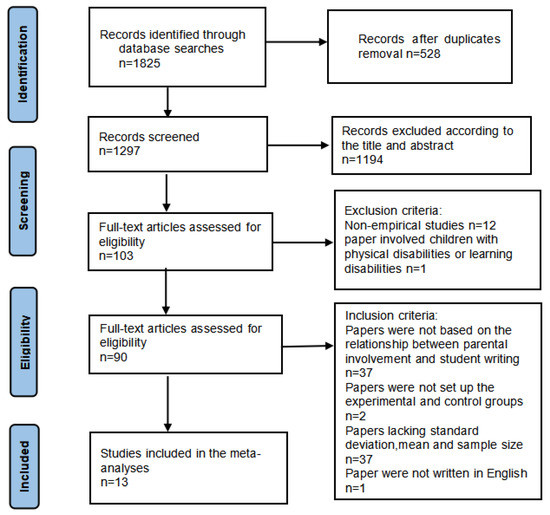
Figure 1.
Flow chart of literature screening.
2.2. Inclusion and Exclusion Criteria
The pieces of literature that met the inclusion and exclusion criteria are included in this study. By reading the method and discussion sections of each article, the pieces of literature that met the following criteria were excluded: 1. Non-empirical studies, which were excluded because they could not provide us with valid data. 2. Case studies [52,53], which were excluded because the results of case studies are not universal. 3. Studies where the participants had physical or learning disabilities [22], which were excluded because physical and learning disabilities might have an impact on students’ writing ability and could lead to a deviation in the study results.
The remaining literature had to meet the inclusion criteria: 1. Studies that explained the measures of parent involvement and student writing ability, which were included because the studies focused on the relationship between parental involvement and student writing ability, and the parental involvement and writing ability were measured. 2. Studies that set up experimental and control groups for writing tests, or single-group experiments with pre-tests and post-tests [54], which were included so as to test whether parental involvement had an impact on student writing ability. 3. Studies where adequate information was reported [55], such as means, standard deviations, and sample sizes, in order to calculate the effect value. 4. Studies where the study language was English [56], because English is more widely used in research publications. Ultimately, 13 articles met the inclusion criteria and avoided the exclusion criteria.
2.3. Coding
This study coded the first author, year, sample size, forms of parental involvement, education stage, region, and intervention time according to the basic information and various characteristics of the literature. The encoded information is provided in Table 1. This study divided parental behavioral participation into activity participation and writing assistance, so as to test whether different forms of parental participation behavior affect student writing ability. The education stage was divided into pre-school and primary education to test the effectiveness of parental involvement at different education stages. The school area was divided into urban and suburban areas to test whether different areas have an impact on student writing ability. The intervention duration was divided into short and long with a boundary of 11 weeks; this was set because the total intervention time divided by the number of studies was approximately 11.

Table 1.
Literature Coding Information.
3. Meta-Analysis Procedures
3.1. The Effect Size
The raw mean difference was only used when the same scale was used in all of the studies in a meta-analysis [57]. Therefore, the standardized mean difference for the effect value calculation was instead applied in this study. The samples with a standardized average difference were known as Cohen’s d. As the overall parameter describing the statistical power, d was slightly biased during the analysis of the effect size. We obtained an unbiased estimate using the correction factor J, which is called Hedges’ g (g value). Cohen explained the threshold for the effect size, where 0.2 is small, 0.5 is medium, and 0.8 is large [58]. In the forest plots, the square and diamond display the estimated g values within a 95% confidence interval (CI), respectively. The calculation formula was as follows:
M1 and M2 are the mean values of the experimental and control groups, respectively. n1 and n2 are the sample sizes of the experimental and control groups, respectively. S is the combined standard deviation. S1 and S2 are the standard deviations of the experimental and control groups, respectively. We used the Comprehensive Meta-Analysis 3.0 (CMA3.0) software to calculate the effect value.
3.2. Heterogeneity Test
In this study, we tested the heterogeneity of the 13 collected studies. A fixed effect model was used when the inter-study heterogeneity was small; otherwise, the random effects model was applied. The heterogeneity test methods mainly included a Q test and an I2 test. Heterogeneity test are shown in Table 2. If the p was <0.1 and I2 was >50%, we considered there to be a significant heterogeneity between the studies [59]. We calculated the Q test result as 122.314 (p < 0.001), and I2 = 90.189, suggesting that there was a significant heterogeneity between the studies. The value of I2 ranged from 0 to 100, and I2 could be considered as a low, moderate, or high degree of heterogeneity when I2 was 25%, 50%, and 75%, respectively [59]. In this study, I2 was 90.189, indicating a high inter-study heterogeneity, which was consistent with the conclusion of the Q test. Therefore, we used a random effects model.

Table 2.
Heterogeneity Test Results.
3.3. Results
Overall impact of parental involvement on student writing ability: In this study, the overall effect value was 0.666 (p < 0.001), (see Figure 2), indicating that parental involvement had a moderate effect on student writing ability and that the results were statistically significant. The heterogeneity of the included studies was high, indicating that existing moderator variables influenced the study results; as such, we further tested these variables with a subgroup analysis.
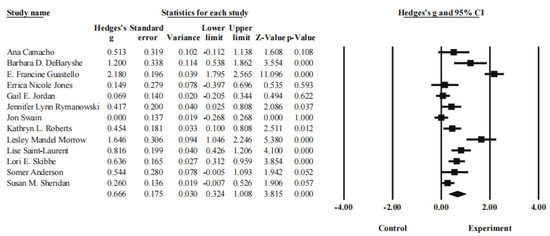
Figure 2.
The overall effect value.
Parent participation behavioral forms: The results showed that the effect size of the activity participation of parents was 0.555 (p < 0.01), that of writing assistance was 0.752 (p < 0.05), and the overall effect value was 0.613 (p < 0.001), (see Figure 3), suggesting not only that there was an overall effect, but also that the specific forms of parental involvement could yield a significant active influence on student writing ability. We speculated that parental writing assistance might be more conducive to improving student writing ability than activity participation. However, the p-value for this was 0.587 > 0.05 between the groups, indicating that this subgroup had no significant effect on the study results. This is contrary to our conjecture, indicating that different parental participation behavior forms do not significantly affect student writing ability.
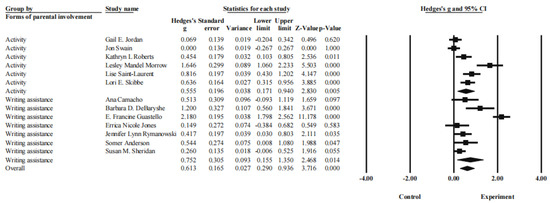
Figure 3.
Forms of parental involvement.
Education stage: Since student literacy skills began to develop before school, maternal education might be closely related to student ability before students enter school [60]. In other words, with an increase in grade, the impact of parental involvement on student writing ability is weakened. Therefore, it is logical and reasonable to conclude that the effect of parental involvement on student writing is at its most significant for pre-school and elementary school students. According to the included pieces of literature, we divided the education stage into pre-school and primary education, and this study identified that the overall effect of parental involvement on the writing ability of students both in pre-school and primary school was significantly active (g = 0.504, p < 0.001). Additionally, the results showed the effect size of pre-school education to be 0.455 (p < 0.01), indicating that parental involvement had a significant, moderate effect on pre-school student writing ability. In primary schools, the effect size was 0.814 (p < 0.05), (see Figure 4), indicating that parental involvement had a greater impact on pupil writing ability than that of pre-school students. However, the p-value between the groups was 0.311 > 0.05, indicating that parental involvement had no statistically significant difference in its effect on student writing ability during the pre-school and primary school stages.
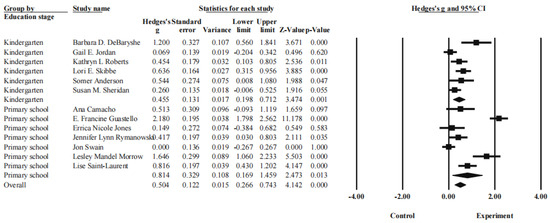
Figure 4.
Education stage.
School area: According to the included literature, this study divided school areas into urban and suburban areas. Generally, the overall effect was 0.543 (p < 0.001), which is within the moderate range; thus, this helps to identify the value of parental involvement in students’ writing ability. Specifically, the effect size of urban schools was 0.889 (p < 0.001), showing that, in urban schools, parental involvement has a great impact on student writing ability. Meanwhile, in suburban schools, parental involvement produces a small impact on student writing ability (g = 0.343, p < 0.05) (see Figure 5). Moreover, the p-value between the groups was 0.044 < 0.05, indicating that the impact of this subgroup was significant. Thus, parental involvement can yield a better influence on student writing ability in urban schools than in suburban schools. Therefore, the differences in school areas affect student writing ability.
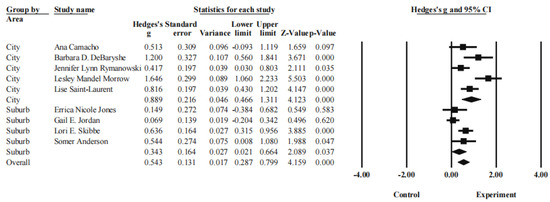
Figure 5.
School area.
Intervention duration: The intervention duration was divided into long-term and short-term according to a threshold of 11 weeks. Firstly, the overall effect (g = 0.361, p < 0.001) confirmed that parental involvement could yield a significant, active effect on student writing ability, regardless of whether the intervention is long-term or short-term. Secondly, long-term intervention was identified to induce a significantly high impact on student writing ability (g = 0.891, p < 0.01), whereas short-time intervention showed a smaller, but still significant, effect (g = 0.291, p < 0.01) (see Figure 6). Furthermore, the p-value between the groups (p = 0.036 < 0.05) indicated that parental intervention duration has a significant impact on student writing ability, and that long-term interventions could be more significantly effective than short-time interventions.
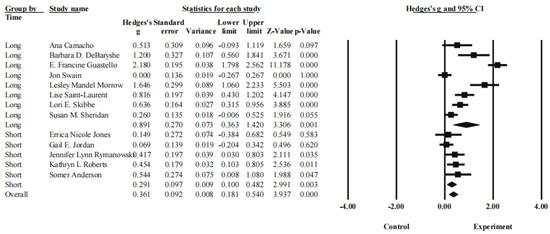
Figure 6.
Intervention duration.
4. Publication Bias
By combining both qualitative and quantitative methods, this study tested the publication bias of the collected studies; this included a funnel plot, fail-safe number, and Egger’s linear regression test. Due to the small sample size, the point distribution on the funnel plot for this study was almost symmetric, thus showing that there was no significant publication bias in the results (see Figure 7). To further confirm the magnitude of the publication bias, Table 3 shows the confidence test with a fail-safe number and the Egger’s linear regression test results. Rosenthal advised that a fail-safe number can help one to calculate the minimum number of unpublished studies needed to overturn the existing conclusions. If this fail-safe number is less than the critical value of 5k + 10 (k is the number of included samples), then this study has a publication bias [61]. With the use of CMA 3.0 software, the fail-safe number was found to be 385, which is much higher than the critical value of 75 (k = 13), demonstrating that this study has no possibility of possessing a publication bias. As a valid tool for identifying biases in meta-analyses, Egger’s linear regression test can even provide an estimate of the causal effects [62]. Moreover, Egger et al. proposed that Egger’s linear regression test can help to judge whether a study has a publication bias and that this is based on whether the intercept in the regression equation is 0 [63]. Egger’s linear regression test showed that the intercept was 4.77 (p = 0.112 > 0.05), suggesting that there was no significant publication bias in this study, which is consistent with the test results of the funnel plot and fail-safe number.
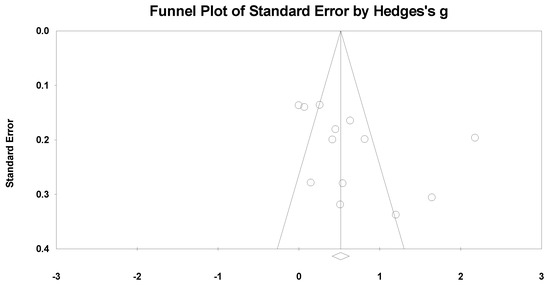
Figure 7.
Funnel plot for overall estimate of parental involvement on student writing ability by mean value of many effects size.

Table 3.
Publication bias confidence tests and results.
5. Discussion
We included 13 studies (see Table 1) that met the inclusion criteria in order to examine whether parental involvement has a statistically significant impact on student writing skills. The overall effect was 0.666 (95% CI [0.324, 1.008], p < 0.001), suggesting that parental involvement has a moderate impact on student writing ability. The experimental group’s student writing ability (where parents participated in student writing) was significantly better than that of the control group’s (where parents did not participate in student writing), which is in line with Coleman’s social capital theory (where Coleman divided family backgrounds into economic capital, which is mainly measured by household income or wealth; human capital, which is mainly based on parental participation in education; and social capital, which is estimated by the interaction between participants) [64]. Given that writing is a complex process based on paying attention to constituent texts and the transcribing of ideas [65], it is a difficult process for students (especially for lower graders). The social capital theory shows that parental participation can help students to improve in many aspects, which also confirms the importance of the effect of parental participation on student writing. Moreover, according to the ecosystem theory, child development may be affected by micro systems, intermediate systems, external systems, macro systems, and time systems, in which microsystems (such as the classroom environment and family environment) have the most direct impact on children [66]. This study verifies the importance of the ecosystem theory in the context of parental involvement in student writing ability, and further confirms the specific approaches of parents who participate in their children’s writing.
This study performed a subgroup analysis to examine whether different forms of parental involvement behavior affect student writing ability (see Table 4). Both parental involvement behavioral approaches, activity participation (g = 0.555, p < 0.01) and writing assistance (g = 0.752, p < 0.05), yielded a moderate effect. However, the difference analysis (Q = 0.295, df = 1, p = 0.587) showed no significant differences between the studies, thus uncovering that student writing ability does not change because of these parental involvement forms; however, this is inconsistent with certain studies, where different parental participation behaviors had different effects on student academic achievement [14,44]. It can be reasonably inferred that the conflict between this study and other studies was due to the fact that the participants in this study were lower grades (pre-school and primary school), who both require more parental involvement in their behavior.

Table 4.
Subgroup Analysis Data.
Furthermore, this paper examined the effectiveness of parental involvement on student writing at different education stages (see Table 4). Parental involvement had a moderate and large effect on pre-school (g = 0.455, p < 0.01) and primary school students (g = 0.814, p < 0.05), respectively. Though the effect size was greater in primary school than pre-school students, the mixed-effects analysis (Q = 1.027, df = 1, p = 0.311) showed no significant differences between the studies, suggesting that parental involvement yields a stable influence on student writing ability, regardless of whether the students are in pre-school or primary school. These findings are consistent with the study conducted by Jeynes, who studied the impact of parental involvement on student academic performance, and concluded that this impact would not change due to different education grades [10]. This study further identified the universal value of parental involvement in writing ability, that is, students at any grade or education level can benefit from writing with parental involvement [33].
Additionally, this study found that different school areas might produce significantly different impacts on student writing ability (see Table 4). Since there were different effect sizes, with a large effect in urban areas (g = 0.889, p < 0.001) and a small effect in suburban areas (g = 0.343, p < 0.05), this study further conducted a mixed-effects analysis (Q = 4.066, df = 1, p = 0.044), whereby it was identified that the significant difference between areas and parental involvement had a greater impact on urban school students’ writing ability. It was more likely for urban school students to have a better family socioeconomic status and writing condition. Moreover, it has been confirmed by many studies that socioeconomic status (SES) can influence student academic achievement. Through a separate survey of affluent, middle-, and low-income families, Guastello and Lenz indicated that parental involvement had its greatest impact on academic performance among the students from affluent families [5]. This was because high SES families did better in providing students with the necessary materials or by helping the students with their learning [67].
Finally, this study accounted for the intervention duration of parental involvement and how it can yield a significant effect on student writing ability (see Table 4). With a threshold of 11 weeks, long-time intervention (g = 0.891, p < 0.01) and short-time intervention (g = 0.291, p < 0.01) showed large and small effect sizes, respectively. The mixed-effects analysis (Q = 4.378, df = 1, p = 0.036) showed significant differences between long-time interventions and short-time interventions, indicating that the effect of the long-time participation of parents on student writing was significantly better than that of short-time parent participation. Consequently, parents were advised to participate in their children’s writing with more patience and more time.
6. Limitation
There are three limitations in the present study. First, according to the inclusion criteria, only 13 studies were included for the meta-analysis. Little attention was paid to other studies that were not written in English; as such, this resulted in a lack of certain grey literature in this study. In the future, it will be necessary to strengthen the integration of all kinds of research, not just studies that are written in English, but also those written in other languages. Furthermore, there was too much heterogeneity between different studies, possibly because the included samples came from different countries across the world. In addition, there were many potential factors that could have influenced these studies, suggesting that further research may need to focus on different countries and moderator variables, other than simply the mode of parental involvement, education stage, city/suburb, and intervention duration.
Author Contributions
Conceptualization, H.Y. and Y.C.; methodology, H.Y.; software, Y.C.; validation, H.Y. and Y.C.; writing—original draft preparation, H.Y. and Y.C.; writing—review and editing, H.Y. and Y.C.; supervision, H.Y.; funding acquisition, H.Y. All authors have read and agreed to the published version of the manuscript.
Funding
This research was funded by National Planning Office of Education Sciences, PRC, grant number [BHA200135].
Institutional Review Board Statement
Not applicable.
Informed Consent Statement
Not applicable.
Data Availability Statement
This study does not involve research data due to its meta-analysis.
Conflicts of Interest
The authors declare no conflict of interest.
References
- Sheridan, S.M.; Knoche, L.L.; Kupzyk, K.A.; Edwards, C.P.; Marvin, C.A. A randomized trial examining the effects of parent engagement on early language and literacy: The Getting Ready intervention. J. Sch. Psychol. 2011, 49, 361–383. [Google Scholar] [CrossRef] [PubMed]
- Roberts, K.L.; Rochester, S.E. Learning through everyday activities: Improving preschool language and literacy outcomes via family workshops. J. Early Child. Lit. 2021, 5081. [Google Scholar] [CrossRef]
- Morrow, L.M.; Young, J. A family literacy program connecting school and home: Effects on attitude, motivation, and literacy achievement. J. Educ. Psychol. 1997, 89, 736. [Google Scholar] [CrossRef]
- Anderson, S.K. The Impact of Parental Involvement on Kindergarten Student Writing Development. Ph.D. Thesis, Walden University, Minneapolis, MN, USA, 2013. [Google Scholar]
- Guastello, E.F.; Lenz, C. Improving Children’s Writing: A Model for Parent Participation. Lang. Lit. Spectr. 2004, 14, 31–47. [Google Scholar]
- Swain, J.; Cara, O.; Vorhaus, J.; Litster, J. The Impact of Family Literacy Programmes on Children’s Literacy Skills and the Home Literacy Environment; University College London: London, UK, 2015. [Google Scholar]
- Jones, E.N. Examining the Influence of Parental Participation in Student Writing Workshops: A Case Study. Ph.D. Thesis, University of Houston, Huston, TX, USA, 2018. [Google Scholar]
- Hill, N.E.; Castellino, D.R.; Lansford, J.E.; Nowlin, P.; Dodge, K.A.; Bates, J.E.; Pettit, G.S. Parent Academic Involvement as Related to School Behavior, Achievement, and Aspirations: Demographic Variations Across Adolescence. Child Dev. 2004, 75, 1491–1509. [Google Scholar] [CrossRef]
- Jeynes, W.H. The relationship between parental involvement and urban secondary school student academic achievement: A meta-analysis. Urban Educ. 2007, 42, 82–110. [Google Scholar] [CrossRef]
- Jeynes, W. A Meta-Analysis of the Efficacy of Different Types of Parental Involvement Programs for Urban Students. Urban Educ. 2012, 47, 706–742. [Google Scholar] [CrossRef]
- Erdem, C.; Kaya, M. A Meta-Analysis of the Effect of Parental Involvement on Students’ Academic Achievement. J. Learn. Dev. 2020, 7, 367–383. [Google Scholar] [CrossRef]
- El Nokali, N.E.; Bachman, H.J.; Votruba-Drzal, E. Parent Involvement and Children’s Academic and Social Development in Elementary School: Parent Involvement, Achievement, and Social Development. Child Dev. 2010, 81, 988–1005. [Google Scholar] [CrossRef]
- Castro, M.; Expósito-Casas, E.; López-Martín, E.; Lizasoain, L.; Navarro-Asencio, E.; Gaviria, J.L. Parental involvement on student academic achievement: A meta-analysis. Educ. Res. Rev. 2015, 14, 33–46. [Google Scholar] [CrossRef]
- Hill, N.E.; Tyson, D.F. Parental involvement in middle school: A meta-analytic assessment of the strategies that promote achievement. Dev. Psychol. 2009, 45, 740–763. [Google Scholar] [CrossRef] [PubMed]
- Boonk, L.; Gijselaers, H.J.; Ritzen, H.; Brand-Gruwel, S. A review of the relationship between parental involvement indicators and academic achievement. Educ. Res. Rev. 2018, 24, 10–30. [Google Scholar] [CrossRef]
- Rattenborg, K.; MacPhee, D.; Walker, A.K.; Miller-Heyl, J. Pathways to Parental Engagement: Contributions of Parents, Teachers, and Schools in Cultural Context. Early Educ. Dev. 2019, 30, 315–336. [Google Scholar] [CrossRef]
- Ju, J.; Li, Y.; Jiang, L. International experience and enlightenment for promoting parents’ participation in home-school cooperation. China Audio Vis. Educ. 2021. [Google Scholar]
- Wilder, S. Effects of parental involvement on academic achievement: A meta-synthesis. Educ. Rev. 2014, 66, 377–397. [Google Scholar] [CrossRef]
- Adodo, I.P. Don’t Assume They Don’t Care: African American Parental Involvement and Implications for Student Engagement and Achievement. Ph.D. Thesis, The University of Arizona, Tucson, AZ, USA, 2019. [Google Scholar]
- Epstein, J.L. School/family/community partnerships: Caring for the children we share. Phi Delta Kappan 2010, 92, 81–96. [Google Scholar] [CrossRef]
- Jeynes, W.H. A practical model for school leaders to encourage parental involvement and parental engagement. Sch. Leadersh. Manag. 2018, 38, 147–163. [Google Scholar] [CrossRef]
- Kim, S.W. Meta-analysis of parental involvement and achievement in East Asian countries. Educ. Urban Soc. 2020, 52, 312–337. [Google Scholar] [CrossRef]
- Singh, K.; Bickley, P.G.; Keith, T.Z.; Keith, P.B.; Trivette, P.; Anderson, E. The Effects of Four Components of Parental Involvement on Eighth-Grade Student Achievement: Structural Analysis of NELS-88 Data. Sch. Psychol. Rev. 1995, 24, 299–317. [Google Scholar] [CrossRef]
- Fan, X. Parental Involvement and Students’ Academic Achievement: A Growth Modeling Analysis. J. Exp. Educ. 2001, 70, 27–61. [Google Scholar] [CrossRef]
- Hong, S.; Ho, H.-Z. Direct and Indirect Longitudinal Effects of Parental Involvement on Student Achievement: Second-Order Latent Growth Modeling Across Ethnic Groups. J. Educ. Psychol. 2005, 97, 32–42. [Google Scholar] [CrossRef]
- Pinquart, M.; Ebeling, M. Parental Educational Expectations and Academic Achievement in Children and Adolescents—A Meta-analysis. Educ. Psychol. Rev. 2020, 32, 463–480. [Google Scholar] [CrossRef]
- Jeynes, W.H. A meta-analysis: The relationship between the parental expectations component of parental involvement with students’ academic achievement. Urban Educ. 2022, 73892. [Google Scholar] [CrossRef]
- Alston-Abel, N.L.; Berninger, V.W. Relationships between home literacy practices and school achievement: Implications for consultation and home–school collaboration. J. Educ. Psychol. Consult. 2018, 28, 164–189. [Google Scholar] [CrossRef] [PubMed]
- Robledo-Ramon, P.; Garcia-Sanchez, J.-N. Strategy instruction for writing composition at school and at home. Estud. Psicol. 2013, 34, 161–174. [Google Scholar] [CrossRef]
- Aram, D. Writing with young children: A comparison of paternal and maternal guidance. J. Res. Read. 2010, 33, 4–19. [Google Scholar] [CrossRef]
- Skibbe, L.E.; Bindman, S.W.; Hindman, A.H.; Aram, D.; Morrison, F.J. Longitudinal Relations Between Parental Writing Support and Preschoolers’ Language and Literacy Skills. Read. Res. Q. 2013, 48, 387–401. [Google Scholar] [CrossRef]
- Li, J.; Hu, Y. Study on the relationship between parents’ learning participation and academic performance of primary and secondary school students-Analysis of a mediated regulatory model based on parent-child relationship and learning confidence. J. East China Norm. Univ. (Educ. Sci. Ed.) 2021, 39, 72. [Google Scholar] [CrossRef]
- Zurcher, M.A. Partnering With Parents in the Writing Classroom. Read. Teach. 2016, 69, 367–376. [Google Scholar] [CrossRef]
- Nye, C.; Turner, H.; Schwartz, J. Approaches to Parent Involvement for Improving the Academic Performance of Elementary School Age Children. Campbell Syst. Rev. 2006, 2, 1–49. [Google Scholar] [CrossRef]
- Chowa, G.A.N.; Masa, R.D.; Tucker, J. The effects of parental involvement on academic performance of Ghanaian youth: Testing measurement and relationships using structural equation modeling. Child. Youth Serv. Rev. 2013, 35, 2020–2030. [Google Scholar] [CrossRef]
- Zhang, W. Overview and implications of parent participation education in OECD member states. Foreign Prim. Second. Educ. 2001, 28–31. [Google Scholar]
- Wang, M.-T.; Sheikh-Khalil, S. Does Parental Involvement Matter for Student Achievement and Mental Health in High School? Child Dev. 2014, 85, 610–625. [Google Scholar] [CrossRef]
- Hall, C. The Impact of Family Engagement on Student Achievement. Netw. Online J. Teach. Res. 2020, 22, 17. [Google Scholar] [CrossRef]
- Mattingly, D.J.; Prislin, R.; McKenzie, T.L.; Rodriguez, J.L.; Kayzar, B. Evaluating Evaluations: The Case of Parent Involvement Programs. Rev. Educ. Res. 2002, 72, 549–576. [Google Scholar] [CrossRef]
- Rymanowski, J.L. School-Home Performance Feedback with Home-Based Writing Activities: The Effects on Elementary Students’ Writing Fluency; Syracuse University: Syracuse, NY, USA, 2011. [Google Scholar]
- Domina, T. Leveling the Home Advantage: Assessing the Effectiveness of Parental Involvement in Elementary School. Sociol. Educ. 2005, 78, 233–249. [Google Scholar] [CrossRef]
- Barger, M.M.; Kim, E.M.; Kuncel, N.R.; Pomerantz, E.M. The relation between parents’ involvement in children’s schooling and children’s adjustment: A meta-analysis. Psychol. Bull. 2019, 145, 855. [Google Scholar] [CrossRef]
- Saint-Laurent, L.; Giasson, J. Effects of a family literacy program adapting parental intervention to first graders’ evolution of reading and writing abilities. J. Early Child. Lit. 2005, 5, 253–278. [Google Scholar] [CrossRef]
- Fan, X.; Chen, M. Parental involvement and students’ academic achievement: A meta-analysis. Educ. Psychol. Rev. 2001, 13, 1–22. [Google Scholar] [CrossRef]
- Kim, S. Fifty years of parental involvement and achievement research: A second-order meta-analysis. Educ. Res. Rev. 2022, 37, 100463. [Google Scholar] [CrossRef]
- Ma, X.; Shen, J.; Krenn, H.Y.; Hu, S.; Yuan, J. A Meta-Analysis of the Relationship Between Learning Outcomes and Parental Involvement During Early Childhood Education and Early Elementary Education. Educ. Psychol. Rev. 2016, 28, 771–801. [Google Scholar] [CrossRef]
- Jeynes, W.H. A Meta-Analysis of the Relation of Parental Involvement to Urban Elementary School Student Academic Achievement. Urban Educ. 2005, 40, 237–269. [Google Scholar] [CrossRef]
- Barwegen, L.M.; Falciani, N.K.; Putnam, S.J.; Reamer, M.B.; Stair, E.E. Academic Achievement of Homeschool and Public School Students and Student Perception of Parent Involvement. Sch. Community J. 2004, 14, 39–58. [Google Scholar]
- Ateş, A. The Relationship between Parental Involvement in Education and Academic Achievement: A Meta-Analysis Study. Pegem J. Educ. Instr. 2021, 11, 50–66. [Google Scholar]
- Erion, J. Parent tutoring: A meta-analysis. Educ. Treat. Child. 2006, 29, 79–106. [Google Scholar]
- Higgins, S.; Katsipataki, M. Evidence from meta-analysis about parental involvement in education which supports their children’s learning. J. Child. Serv. 2015, 10, 280–290. [Google Scholar] [CrossRef]
- Dong, Y.; Wu, S.X.Y.; Dong, W.Y.; Tang, Y. The Effects of Home Literacy Environment on Children’s Reading Comprehension Development: A Meta-Analysis. Educ. Sci. Theory Pract. 2020, 20, 63–82. [Google Scholar] [CrossRef]
- Yu, L.; Yu, J.J.; Tong, X. Social–Emotional Skills Correlate with Reading Ability among Typically Developing Readers: A Meta-Analysis. Educ. Sci. 2023, 13, 220. [Google Scholar]
- Smith, T.E.; Sheridan, S.M.; Kim, E.M.; Park, S.; Beretvas, S.N. The effects of family-school partnership interventions on academic and social-emotional functioning: A meta-analysis exploring what works for whom. Educ. Psychol. Rev. 2020, 32, 511–544. [Google Scholar] [CrossRef]
- Tan, C.Y.; Peng, B.; Lyu, M. What types of cultural capital benefit students’ academic achievement at different educational stages? Interrogating the meta-analytic evidence. Educ. Res. Rev. 2019, 28, 100289. [Google Scholar]
- Graham, S.; Liu, X.; Aitken, A.; Ng, C.; Bartlett, B.; Harris, K.R.; Holzapfel, J. Effectiveness of literacy programs balancing reading and writing instruction: A meta-analysis. Read. Res. Q. 2018, 53, 279–304. [Google Scholar]
- Borenstein, M.; Hedges, L.V.; Higgins, J.P.; Rothstein, H.R. Introduction to Meta-Analysis; John Wiley Sons: Hoboken, NJ, USA, 2009. [Google Scholar]
- Cohen, J. Quantitative methods in psychology: A power primer. Psychol. Bull. 1992, 112, 1155–1159. [Google Scholar] [CrossRef]
- Higgins, J.P.; Thompson, S.G.; Deeks, J.J.; Altman, D.G. Measuring inconsistency in meta-analyses. BMJ 2003, 327, 557–560. [Google Scholar] [CrossRef] [PubMed]
- DeBaryshe, B.D.; Buell, M.J.; Binder, J.C. What a Parent Brings to the Table: Young Children Writing with and without Parental Assistance. J. Lit. Res. 1996, 28, 71–90. [Google Scholar] [CrossRef]
- Rosenthal, R. The file drawer problem and tolerance for null results. Psychol. Bull. 1979, 86, 638. [Google Scholar] [CrossRef]
- Bowden, J.; Davey Smith, G.; Burgess, S. Mendelian randomization with invalid instruments: Effect estimation and bias detection through Egger regression. Int. J. Epidemiol. 2015, 44, 512–525. [Google Scholar] [PubMed]
- Egger, M.; Smith, G.D.; Schneider, M.; Minder, C. Bias in meta-analysis detected by a simple, graphical test. BMJ 1997, 315, 629–634. [Google Scholar] [CrossRef]
- Zhou, W.Y. Parent Involvement: Conceptual Framework and measurement Indicators. Foreign Educ. Res. 2015, 42, 113–122. [Google Scholar]
- Scull, J.; Mackenzie, N.M.; Bowles, T. Assessing early writing: A six-factor model to inform assessment and teaching. Educ. Res. Policy Pract. 2020, 19, 239–259. [Google Scholar] [CrossRef]
- Härkönen, U. The Bronfenbrenner Ecological Systems Theory of Human Development; University of Joensuu: Joensuu, Finland, 2001. [Google Scholar]
- Cakiroglu, A.; Kuruyer, H.G. First grade elementary school student’s family involvement in the process of reading and writing skills acquisition. Procedia-Soc. Behav. Sci. 2012, 46, 5588–5592. [Google Scholar] [CrossRef]
Disclaimer/Publisher’s Note: The statements, opinions and data contained in all publications are solely those of the individual author(s) and contributor(s) and not of MDPI and/or the editor(s). MDPI and/or the editor(s) disclaim responsibility for any injury to people or property resulting from any ideas, methods, instructions or products referred to in the content. |
© 2023 by the authors. Licensee MDPI, Basel, Switzerland. This article is an open access article distributed under the terms and conditions of the Creative Commons Attribution (CC BY) license (https://creativecommons.org/licenses/by/4.0/).

